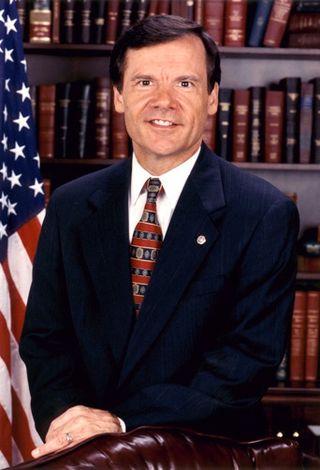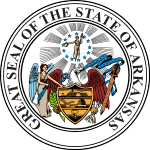
Arkansas is a landlocked state in the south-central region of the Southern United States. It is bordered by Missouri to the north, Tennessee and Mississippi to the east, Louisiana to the south, Texas to the southwest, and Oklahoma to the west. Its name is from the Osage language, a Dhegiha Siouan language, and referred to their relatives, the Quapaw people. The state's diverse geography ranges from the mountainous regions of the Ozark and Ouachita Mountains, which make up the U.S. Interior Highlands, to the densely forested land in the south known as the Arkansas Timberlands, to the eastern lowlands along the Mississippi River and the Arkansas Delta.

Joseph Taylor Robinson, also known as Joe T. Robinson, was an American politician from Arkansas. A member of the Democratic Party, he represented Arkansas in the United States Senate from 1913 to 1937, serving for four years as Senate Majority Leader and ten as Minority Leader. He previously served as the state's 23rd governor, and was also the Democratic vice presidential nominee in the 1928 presidential election.

John Nichols Boozman is an American politician and former optometrist serving as the senior United States senator from Arkansas, a seat he has held since 2011. A member of the Republican Party, he was the U.S. representative for Arkansas's 3rd congressional district from 2001 to 2011. He is the dean of Arkansas's congressional delegation.
Southern Democrats are affiliates of the U.S. Democratic Party who reside in the Southern United States.

The 2002 United States Senate elections featured a series of fiercely contested elections that resulted in a victory for the Republican Party, which gained two seats and thus a narrow majority from the Democratic Party in the United States Senate. The Senate seats up for election, known as class 2 Senate seats, were last up for regular election in 1996. The election cycle was held on November 5, 2002, almost fourteen months after the September 11, 2001 attacks.

Young Timothy Hutchinson is an American Republican politician, lobbyist, and former United States senator from the state of Arkansas.

The 2002 United States elections were held on November 5, in the middle of Republican President George W. Bush's first term. Republicans won unified control of Congress, picking up seats in both chambers of Congress, making Bush the first President since Franklin D. Roosevelt in 1934 to gain seats in both houses of Congress. In the gubernatorial elections, Democrats won a net gain of one seat. The elections were held just a little under fourteen months after the September 11 attacks. Thus, the elections were heavily overshadowed by the War on Terror, the impending Iraq War, the early 2000s recession, and the sudden death of Democratic Senator Paul Wellstone of Minnesota about one week before the election.

The General Assembly of Arkansas is the state legislature of the U.S. state of Arkansas. The legislature is a bicameral body composed of the upper house Arkansas Senate with 35 members, and the lower Arkansas House of Representatives with 100 members. All 135 representatives and state senators represent an equal number of constituent districts.

The 2000 Vermont gubernatorial election took place on November 7, 2000. Incumbent Democratic Governor Howard Dean won re-election. The campaign was dominated by the fallout from the passage of a civil union bill and the subsequent backlash encapsulated by the slogan Take Back Vermont. Ruth Dwyer, the Republican nominee in 1998, ran again in 2000 and was closely tied to the Take Back Vermont movement. Howard Dean, the Democratic governor, favored civil unions and was a primary target of Take Back Vermont.

Stephen Allen Womack is an American politician serving as the U.S. representative for Arkansas's 3rd congressional district since 2011. The district, which was once represented by former Senator J. William Fulbright, covers much of northwestern Arkansas, including Fort Smith, Fayetteville, Springdale, and Womack's hometown of Rogers. A member of the Republican Party, Womack was mayor of Rogers before his election to Congress.

The 2006 United States House of Representatives elections in Arkansas were held on November 4, 2006, to determine who would represent the state of Arkansas in the United States House of Representatives. Arkansas has four seats in the House, apportioned according to the 2000 United States census. Representatives are elected for two-year terms. Every incumbent won re-election easily.

Eric Alan "Rick" Crawford is an American politician who has been the U.S. representative for Arkansas's 1st congressional district since 2011. He is a member of the Republican Party. Before he was elected to Congress, Crawford was a radio announcer, businessman, and U.S. Army soldier.

The 2012 United States House of Representatives elections in Arkansas occurred on Tuesday, November 6, 2012, to elect the four U.S. representatives from the state, one from each of the state's four congressional districts. The elections coincided with the elections of other federal and state offices, including a quadrennial presidential election.
The State government of Arkansas is divided into three branches: executive, legislative and judicial. These consist of the state governor's office, a bicameral state legislature known as the Arkansas General Assembly, and a state court system. The Arkansas Constitution delineates the structure and function of the state government. Since 1963, Arkansas has had four seats in the U.S. House of Representatives. Like all other states, it has two seats in the U.S. Senate.

The 2014 United States House of Representatives elections in Arkansas was held on Tuesday, November 4, 2014 to elect the four U.S. representatives from the state of Arkansas, one from each of the state's four congressional districts. The elections coincided with the elections of other federal and state offices, including the governor of Arkansas and a United States senator.

Bruce Eugene Westerman is an American politician serving as the U.S. representative for Arkansas's 4th congressional district. Previously, he served as member and the majority leader of the Arkansas House of Representatives.

The 2016 United States House of Representatives elections in Arkansas were held on Tuesday, November 8, 2016 to elect the four U.S. representatives from the state of Arkansas, one from each of the state's four congressional districts. The elections coincided with the elections of other federal and state offices, including President of the United States. The primaries were held on March 1.

The 2018 United States House of Representatives elections in Arkansas were held on Tuesday, November 6, 2018, to elect the four U.S. representatives from the U.S. state of Arkansas; one from each of the state's four congressional districts. Primaries were held on May 22, 2018. The elections and primaries coincided with the elections and primaries of other federal and state offices. Polls were open from 7:30 AM to 7:30 PM CST. This election marked the first time in eight years where the Democrats contested every seat.

The 2020 United States House of Representatives elections in Arkansas were held on November 3, 2020, to elect the four U.S. representatives from the state of Arkansas, one from each of the state's four congressional districts. The elections coincided with the 2020 U.S. presidential election, as well as other elections to the House of Representatives, elections to the United States Senate, and various state and local elections.

The 2022 United States House of Representatives elections in Arkansas were held on November 8, 2022, to elect the four U.S. representatives from the state of Arkansas, one from each of the state's four congressional districts. The elections coincided with the Arkansas gubernatorial election, as well as other elections to the U.S. House of Representatives, elections to the U.S. Senate, and various state and local elections. Primary elections were held on May 24.



















